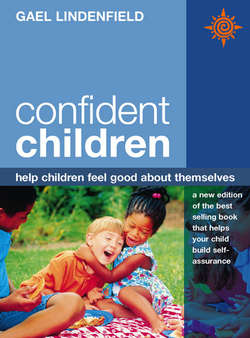Читать книгу Confident Children: Help children feel good about themselves - Gael Lindenfield, Gael Lindenfield - Страница 30
Exercise: Sabotaging behaviours of my inner child
ОглавлениеThis exercise will help you to identify your own specific sabotage habits so that you can be more on your guard, bring them into your consciousness and therefore have more control over them.
This exercise will take at the very least an hour and a half; if you can spare longer you will benefit even more from doing it. Find somewhere to sit where you can be sure of having uninterrupted peace. You will need some photos of your childhood or any significant memorabilia such as toys or books and, if possible, some relaxing music.
Spend 5 to 10 minutes looking through your photos or at your objects.
Put on the music you have chosen and spend two or three minutes making a conscious effort simply to relax. Once you feel relaxed allow your mind to ‘wander through’ some of the memories of your childhood. After a while, spend 20 minutes focusing your mind on some of the disappointments, hurts and losses you can either remember feeling or can imagine you must have felt. Remember that you may not be searching for major traumas, but rather a series of smaller incidents, because these together can often add up to a significant wound. If you find specific memories hard to recall, reflect quite generally on your relationships and the lifestyle or ethos of your family or school. You can make a note of these as you remember each.
Now try to make a link between these early experiences (i.e. your inner-child’s wounds) and possible difficulties you could (or indeed do) have in parenting your child in the way you would like to do. Use the list I gave on page 32 as a guide, but remember that it is not an exhaustive list, so add some of your own.
Make your own list. It might include points like these:
‘I may be too bullying because I resented my father’s strictness.’
‘I could over-compensate with too much generosity because my parents were mean.’
‘I am possibly over-protective because no one protected me from being hurt.’
‘I could resent my children’s freedom to have adventures because we had such a quiet, sheltered upbringing and I felt totally unprepared for the knocks and challenges you can get in life.’
‘I might get over-anxious about academic achievements because my school failed to help me realize my potential.’
‘Perhaps I’m trying to imitate my parents too much by not letting the children “fight it out” because we were never allowed to argue at home.’
‘I could over-react when the children criticize me because I was rarely allowed to speak my mind.’
Discuss these with your partner, a trusted friend and even your children if they are old enough. Ask them to give you feedback if ever they think you are dampening your child’s confidence with one of these behaviours.
Another not-so-obvious way in which children’s confidence gets damaged is through their parents’ abandonment of their own dreams. When this has happened children have very often picked up either a direct or indirect message which, in effect, says ‘All I really have left in life is you and my hopes for your future.’
Children who feel they have this kind of responsibility for their parents’ happiness are almost guaranteed to feel a continuous sense of
It is all too easy to find ourselves literally‘living through’ our children
failure – because however brilliant their exam results may be, however beautiful or strong they make themselves, however obedient or helpful they are, however ‘nice’ their friends may be, or however hard they try to smooth any troubled waters – the reality, almost inevitably, will be that Mum and/or Dad will still find life disappointing. (After all, vicarious pleasure is rarely as good as the ‘real stuff’!)
Very few parents would, of course, intentionally ‘set-up’ their children for such failure, but nevertheless their self-neglect or self-sacrificing behaviour conveys the same message. I am sure you can think of at least two or three examples of happy, ambitious, talented,
